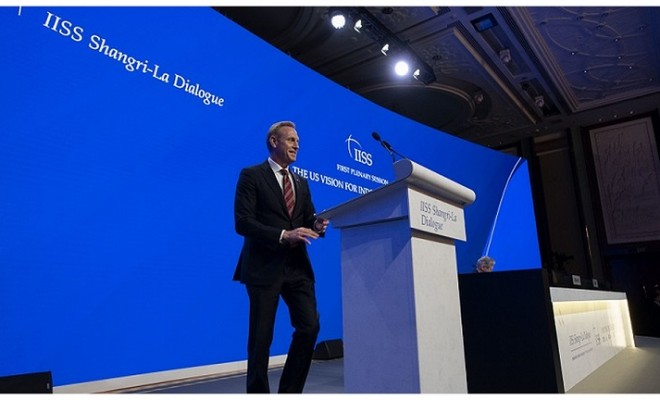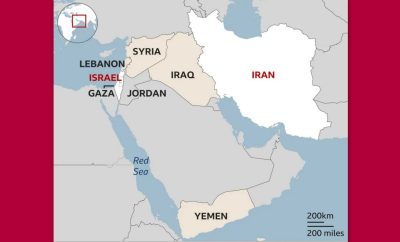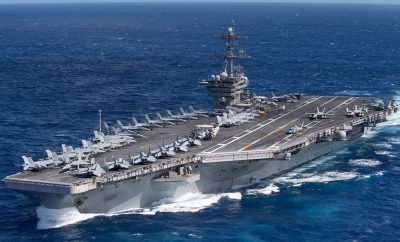
Australia-Japan-United States Defense Ministers Meeting Joint Press Statement
Australian Minister for Defence Linda Reynolds, Japanese Minister of Defense Takeshi Iwaya, and U.S.Acting Secretary of Defense Patrick Shanahan, convened a trilateral defense ministerial meeting in Singapore on June 1 on the margins of the 18th International Institute for Strategic Studies (IISS) Asia Security Summit (2019 Shangri-La Dialogue). The ministers were united in their shared commitment to do more together in support of security, stability, and prosperity in the Indo-Pacific region. This was the eighth meeting among the three nations’ defense leaders.
Minister Iwaya and Acting Secretary Shanahan congratulated Minister Reynolds on her appointment to Minister for Defence following Australia’s recent elections. The ministers affirmed their shared vision for an Indo-Pacific region that is open, inclusive, rules based and respectful of sovereignty, where disputes are resolved peacefully and free of coercion. The ministers recognized the importance of supporting Association of South East Asian Nations-led regional architecture and their support for ASEAN centrality which has played an instrumental role in establishing norms of behavior and habits of cooperation in the region. The Australian and Japanese ministers welcomed the United States Indo-Pacific Strategy Report announced by Acting Secretary Shanahan. The ministers agreed to continue to closely coordinate support to the region to maximize the benefits of their national and combined engagement activities in the region in a transparent, efficient and effective manner under their shared strategic vision.
The ministers underscored the importance of the international community’s ongoing commitment to achieving North Korea’s abandonment of all of its weapons of mass destruction, ballistic missiles, and related programs and facilities in a complete, verifiable, and irreversible manner in accordance with relevant United Nations Security Council resolutions (UNSCRs). The ministers welcomed the United States’ and Republic of Korea’s diplomatic efforts to achieve the final, fully verified denuclearization of North Korea and called on North Korea to return to negotiations with the United States toward this goal. They confirmed that while a diplomatic path to peace on the Korean Peninsula exists, North Korea remains an extraordinary threat, exemplified by its recent missile launches, that requires continued vigilance. They agreed to continue to fully enforce all relevant United Nations Security Council resolutions. The ministers welcomed and reaffirmed their commitment to sustained international cooperation to deter, disrupt, and ultimately eliminate illicit activities, such as illegal ship-to-ship transfers.
The ministers expressed strong opposition to the use of any coercive unilateral actions that seek to alter the status quo or increase tensions in the East China Sea. They also expressed their intention to remain in close contact on the security situation in that area with a view to deter such actions.
The ministers discussed the importance of adherence to international law and their shared commitment to upholding freedom of navigation and overflight in the South China Sea. The ministers remained seriously concerned about any action including militarization of disputed features in the South China Sea that are destabilizing or dangerous. They emphasized the importance of the peaceful resolution of conflict in accordance with the United Nations Convention on the Law of the Sea (UNCLOS), and expressed strong opposition to the use of force or coercion to alter the status quo; calling instead for all countries in the region to take meaningful steps to ease tension and build trust. All sides called for the Code of Conduct for the South China Sea to be consistent with existing international law, as reflected in UNCLOS; to not prejudice the interests of third parties or the rights of all states under international law; to reinforce existing inclusive regional architecture; and to strengthen parties’ commitments to cease actions that would complicate or escalate disputes.
The ministers underscored their commitment to work with their Pacific partners to support a Pacific region that is prosperous, secure and respects sovereignty. The ministers welcomed and acknowledged the significance of each state’s military-to-military activities, particularly when those activities contributed to whole of government engagement with the Pacific.
The ministers agreed on a Strategic Action Agenda (SAA) that articulates their shared long-term vision for trilateral cooperation in the Indo-Pacific region. They affirmed the SAA would enable their respective defense organizations to plan and implement enhanced trilateral defense cooperative activities.
The ministers underscored the close defense relationship between the three countries, and agreed to do more to coordinate their respective regional defense engagement activities, such as joint exercises and training and capacity building.
• Australia-Japan-United States Strategic Action Agenda
The defense ministers of Australia, Japan and the United States affirm their countries’ alignment in strategic interests and universal principles, including a commitment to democracy, human rights, free trade, and the rules-based international order. Together, the three countries recognize the importance of enhancing engagement with our Indo-Pacific partners, in order to foster regional prosperity, resilience and transparency in a time of geostrategic change.
The trilateral relationship complements the strong and effective bilateral defense relationships between each of the three countries, and enables us to pool our resources in support of peace, security and prosperity in the Indo-Pacific region. The three defense ministers are committed to advancing trilateral cooperation, enhancing engagement with like minded partners in the region, and reinforcing the rules-based global order through actively supporting key regional security and defense architectures.
This Strategic Action Agenda articulates our vision for trilateral activities, and our strong commitment to work both trilaterally and together with our regional partners. To that end, Australia, Japan and the United States intend to pursue the following lines of effort:
- Strengthen trilateral cooperation in the areas of maritime security, humanitarian assistance and disaster relief, peacekeeping, counter-terrorism, amphibious activities, and non-conventional domains like space, cyberspace and the electromagnetic spectrum.
- In close collaboration with regional partners, identify and coordinate opportunities to build partner capacity through regular information sharing, complementary programs and cooperative activities.
- Increase the complexity and sophistication of trilateral exercises to enhance interoperability, build common understanding, and better enable our defence forces to work together to contribute to peace and security in the Indo-Pacific region.
- Promote transparency, regional cooperation and the rule of law through port visits and other defense-related activities that demonstrate every nation’s right to freedom of navigation and overflight, in accordance with international law.
- Improve common understanding and shared regional situational awareness through enhanced trilateral information sharing.
The three defense ministers commit to identifying new opportunities to further trilateral cooperation, with the objectives of maintaining and promoting a free, open, stable and prosperous Indo-Pacific region.
• Shanahan: Partners Must Join U.S. in Investing in Indo-Pacific Region
The United States military is partnering with nations from across a wide swath of the Indo-Pacific region, and those nations must follow with their own investments if the partnerships are to grow, Acting Defense Secretary Patrick M. Shanahan said in a speech at the Shangri-La Dialogue in Singapore.
At the International Institute for Strategic Studies-sponsored defense summit today, the acting defense secretary said the U.S. has more than 370,000 service members in the Indo-Pacific region, training and working alongside allied and partner forces there.
The U.S. Pacific Command, he said, has four times more assigned forces than any other geographic combatant command.
”Across the Indo-Pacific, the United States has more than 2,000 aircraft, providing the ability to rapidly project power across the vast distances of this region,” Shanahan said. ”More than 200 ships and submarines ensure freedom of navigation, search and rescue, and rapid assistance in the event of natural disasters. We are investing in advanced missile defense systems, interoperable with allied systems in Japan, Australia and South Korea.”
The acting defense secretary called on partner nations to do their part to build security in their own countries, and strengthen alliances with neighboring nations.
”The Indo-Pacific is our priority theater,” he said. ”We are where we belong. We are investing in this region. We are investing in you, and with you, and we need you to invest further in yourselves. We need you to invest in ways that take more control of your sovereignty and your ability to exercise sovereign choices.”
Every nation, Shanahan said, has a responsibility to contribute to a free and open Indo-Pacific region. The United States will uphold its commitments to the region, he said, but allies and partners must contribute their fair share to the combined efforts to secure freedom and prosperity there.
”We need you to invest sufficiently in your own defense,” he said. ”It strengthens deterrence. Build third-party capacity — it helps the network scale. Uphold rules-based international order — it keeps the playing field level. Provide access to address contingencies — it makes us more responsive. Strengthen interoperability and think carefully about the implications of defense sales; you are buying a long-term relationship, not just a platform.”
Shanahan said the U.S. has a long history of engagement and partnership in the Indo-Pacific region, and that relationships there are growing.
”Our defense relationships have expanded along with this region’s prosperity,” he said. ”And as our own economic interests have increased, this region’s prosperity has increased by the stabilizing influence of our defense relationships. So the synergy between prosperity and security is well understood.”
For that security, and prosperity to continue, the acting defense secretary said that investments in partnerships and security will need to continue.
”As you invest in yourself, know that we are strengthening even further our unrivaled networks of alliances and partnerships,” Shanahan said. ”We know this region’s size and complexity requires the greatest degree of cooperation.”
Info photo: Acting Defense Secretary Patrick M. Shanahan speaks at the Shangri-La Dialogue in Singapore, June 1, 2019.




